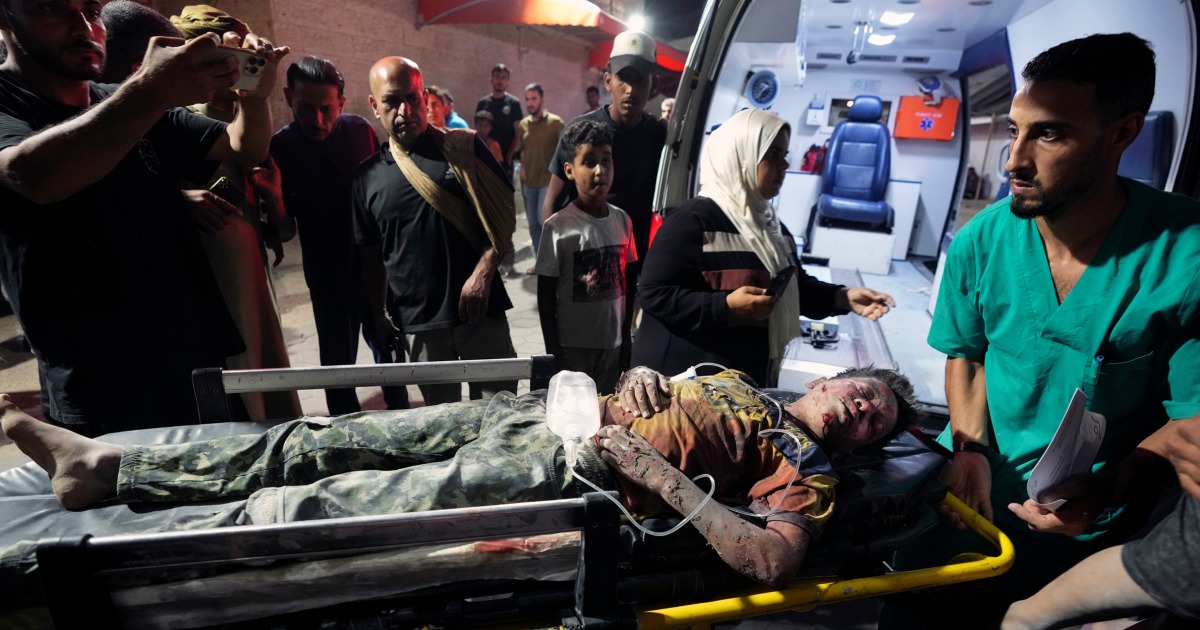Nearly three dozen people were killed Sunday night in Rafah in an Israeli airstrike that hit an area where where internally displaced civilians were reportedly sheltering in tents, Palestinian health officials said.
The Gaza Health Ministry reported at least 35 deaths, the majority being women and children, in the strike on the Tal al-Sultan neighborhood. The Palestine Red Crescent Society warned that the number of casualties may rise as many were trapped in flames that erupted following the bombardment.
“It is important to note that this location was designated by the Israeli occupation as a humanitarian area, and citizens were coerced into evacuating to it,” the humanitarian and medical aid group said.
Médecins Sans Frontières, known as Doctors Without Borders in English, said that at least 15 dead and dozens of injured people were taken to a trauma stabilization point that the organization supports.
“We are horrified by this deadly event, which shows once again that nowhere is safe,” the organization said. “We continue to call for an immediate and sustained ceasefire in Gaza.”
Footage shared to social media and verified by NBC News showed a tent area engulfed in flames as screaming Palestinians fled for safety and civil defense crews worked to extinguish the blaze.
One video showed a seemingly unconscious man being dragged by his feet out of a walled area. Two men who pulled him out then walked back into the flames, seemingly to find more people.
Other videos from the scene showed disturbing images, including severely burned corpses and a man holding what appeared to be the headless body of a small child.
The Israel Defense Forces said the strike targeted two Hamas leaders who it said were responsible for organizing terror attacks in the occupied West Bank area. It was aware of reports that civilian tents were ignited in the strike and said the incident was “under review.”
“The strike was carried out against legitimate targets under international law,” the IDF said in a statement, adding that it used “precise munitions” based on “precise intelligence that indicated Hamas’ use of the area.”
In a statement, Hamas describe the strike as a horrific “massacre.” It did not confirm the death of the commander or senior leader.
Earlier Sunday, Hamas’ military wing, Al-Qassam Brigades, announced a missile barrage in response to what it called the “Zionist massacres against civilians.” The IDF said eight projectiles were identified crossing from the area of Rafah into Israeli territory and that a number of projectiles were intercepted by the IDF Aerial Defense Array.
One of those interceptions was witnessed by an NBC News journalist after sirens warning people of incoming fire sounded in Israel for the first time in several weeks. There were no immediate reports of casualties or damage in the area.
The attack comes just two days after the International Court of Justice, a United Nations body, ordered Israel to stop its military assault on Rafah, citing the “immediate risk” to Palestinians in the border city. In his ruling, judge Nawaf Salam, president of the ICJ, said Israel had failed to sufficiently address and dispel concerns raised by its offensive.
Prior to Israel’s escalation of operations in Rafah earlier this month, more than 1 million civilians were believed to be sheltering in the city after it was designated a safe zone earlier in the war. The ICJ ruling said at least 800,000 people were forced to flee the area earlier this month, but many more remain.
An Israeli official told NBC News on Friday that Prime Minister Benjamin Netanyahu was meeting with legal advisers to review the ruling. The ruling, which the ICJ has no power to enforce, is unlikely to stop Israel’s actions, with Netanyahu’s government previously condemning the case brought by South Africa.
Netanyahu has faced increasing scrutiny internationally and domestically over how Israel is conducting the war that launched after the Oct. 7 Hamas-led attack, which officials said killed an estimated 1,200 people. Around 250 others were taken hostage and about half of them are thought to still be captive in Gaza. Around a quarter of the remaining hostages are believed to be dead.
More than 35,000 people have been killed in Gaza over the last seven months of war, according to local health authorities. Aid groups have warned of catastrophic conditions for civilians who lack access to food and clean water, causing a rampant spread of disease and famine in some areas of the enclave.
Netanyahu and other senior Israeli leaders have vowed to continue the war until Hamas has been eliminated and all of the hostages are brought home, though a group of family members has urged the government to agree to a hostage release deal with Hamas.

